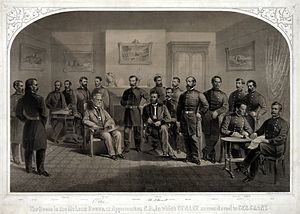This is your morning Open Thread. Pour your favorite beverage and review the past and comment on the future.
Find the past “On This Day in History” here.
April 13 is the 103rd day of the year (104th in leap years) in the Gregorian calendar. There are 262 days remaining until the end of the year.
On this day in 1742, George Frideric Handel’s Messiah premieres in Dublin, Ireland.
Nowadays, the performance of George Friedrich Handel’s Messiah oratorio at Christmas time is a tradition almost as deeply entrenched as decorating trees and hanging stockings. In churches and concert halls around the world, the most famous piece of sacred music in the English language is performed both full and abridged, both with and without audience participation, but almost always and exclusively during the weeks leading up to the celebration of Christmas. It would surprise many, then, to learn that Messiah was not originally intended as a piece of Christmas music. Messiah received its world premiere on this day in 1742, during the Christian season of Lent, and in the decidedly secular context of a concert hall in Dublin, Ireland.
Messiah is an English-language oratorio composed by George Frideric Handel, and is one of the most popular works in the Western choral literature. The libretto by Charles Jennens is drawn entirely from the King James and Great Bibles, and interprets the Christian doctrine of the Messiah. Messiah (often but incorrectly called The Messiah) is one of Handel’s most famous works. The Messiah sing-alongs now common at the Christmas season usually consist of only the first of the oratorio’s three parts, with “Hallelujah” (originally concluding the second part) replacing His Yoke is Easy in the first part.
Composed in London during the summer of 1741 and premiered in Dublin, Ireland on 13 April 1742, it was repeatedly revised by Handel, reaching its most familiar version in the performance to benefit the Foundling Hospital in 1754. In 1789 Mozart orchestrated a German version of the work; his added woodwind parts, and the edition by Ebenezer Prout, were commonly heard until the mid-20th century and the rise of historically informed performance.

 On this day in 1961, aboard the spacecraft Vostok 1, Soviet cosmonaut
On this day in 1961, aboard the spacecraft Vostok 1, Soviet cosmonaut 

Recent Comments